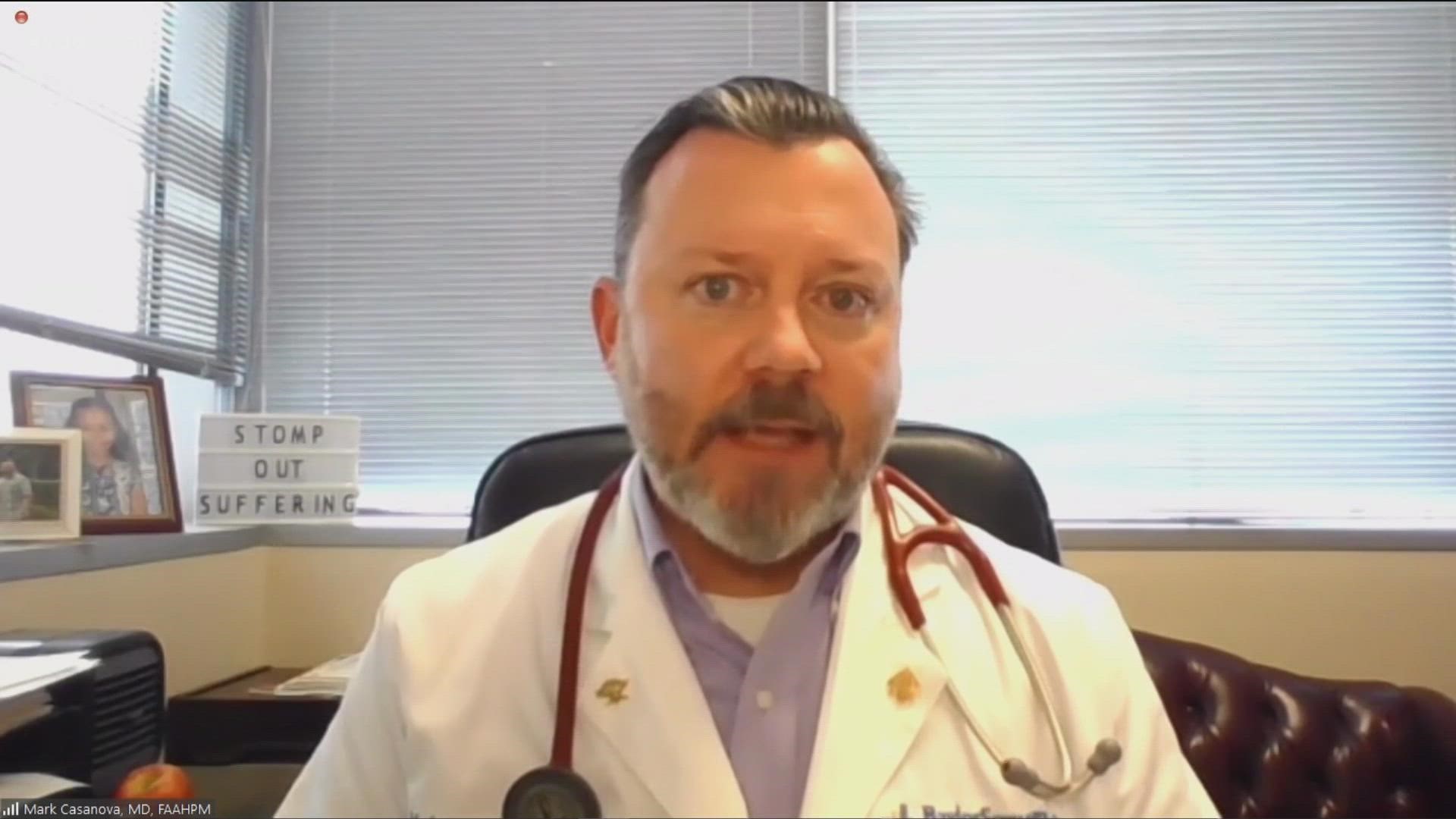TEXAS, USA — As reports of confirmed cases of the omicron variant continue to come in, KVUE spoke with Dr. Mark Casanova, a member of the Texas Medical Association's COVID-19 Task Force, about the variant and what they've learned and are still working to find out.
What's the latest regarding the omicron variant?
"Well, what we're seeing in numbers coming out of South Africa just today is a significant increase in the number of cases. So what this tells us is that the omicron on paper appears to be matching the omicron in real life. So what we mean by that is surveillance for new variants picked up omicron on the radar and because of is mutations, there's concern that it's going to be more transmissible. But we don't know yet is does it cause more illness or a greater degree of illness for those who are infected? I think we're getting the answer to the first question, which is is it more transmissible? Based on these numbers we're seeing out of South Africa and other countries.
While early on, is omicron looking to be similar to the delta variant?
The delta variant … looked bad on paper and proved to behave badly. And that's, I think, where we're all at right now in terms of monitoring this. It is still a little bit too early. There is one key difference, and that is the number of individuals across the globe, but here in the U.S., who have been vaccinated against COVID 19. So that was a difference as delta was surging. We, too, were also still attempting to surge in vaccination numbers. So we in essence tapped the brakes to a certain degree on the potential impact of delta, if delta had been earlier in the course of this pandemic, before we had vaccines available. So that's an unknown factor, and that's what will take scientists about two weeks to figure out. If you're wondering what's the magic behind two weeks, it's really honestly the unfolding of natural events: individuals getting infected, the virus spreading and then us analyzing who's getting infected more and to what degree. So do we see differences between vaccinated individuals and unvaccinated? And what's the degree of illness?
How are unvaccinated people fairing against the omicron variant so far?
"We do know that there are many individuals who as of yet are not vaccinated. We also know from our experience with both alpha and delta strains that if an individual was infected with the prior strain of COVID, they still have a 5.5 times greater likelihood of getting re-infected compared to somebody who's been immunized and developing a breakthrough infection. The other thing that worries us about this omicron is when we look at the mutation profile, there's a strong suggestion that it will break through or, in essence, pose a real threat to infection in those who had been previously infected. So, in other words, for a person to say, 'I had COVID, I came through it.' OK, that was in the summer of 2020. I would not hedge bets that you carry any significant protection or meaningful protection against omicron."
How are vaccinated people holding up?
"We may also be losing some protection from the vaccines. But so far, what we're seeing are those individuals, particularly the two in the U.S. and granted, it's only two, both of those individuals were vaccinated and seem to be demonstrating mild disease. So again, we still feel that vaccines are holding the line. To what extent? That's where we need probably two weeks of real life, real world data to crunch those numbers and see what the effect is."
While there haven't been any omicron variant cases reported in Texas as of Friday afternoon, should we assume it's here?
"Assume it's here. We know it's here, at least in the U.S., but assume it's moved into your neck of the woods. I think that is a pretty safe assumption. It's not a matter of if; it's merely a matter of when. When we detect these and we see increases in case numbers, it means it's already been transmitting in a community for the preceding two weeks, maybe even a little bit more. In light of that, if you are fully vaccinated, great. If you're still lacking a booster, get that booster ASAP. If you've not yet been vaccinated, we're not going to change our tune. We're still continuing to plead with you and encourage you to get vaccinated. In addition to all of that, it's the same pandemic commandments: washing your hands, watching your distance and wearing your mask. These three aspects can at least slow the spread of the virus, and that's what we need to do at any stage of the pandemic is you want to try to get, if you can, one, two, maybe three steps ahead of it and slow the spread."
Are you concerned the omicron variant could spark another surge?
"Well, I think we would be remiss if we didn't have it on our radar, and we weren't prepared for that to unfold. Do we hope and pray it doesn't? Of course we do. Do we hope and pray that as we get a little bit more information about this in the coming weeks, that it proves vaccines are reasonably holding the line? Yes, obviously. But we need to be prepared."
PEOPLE ARE ALSO READING:

